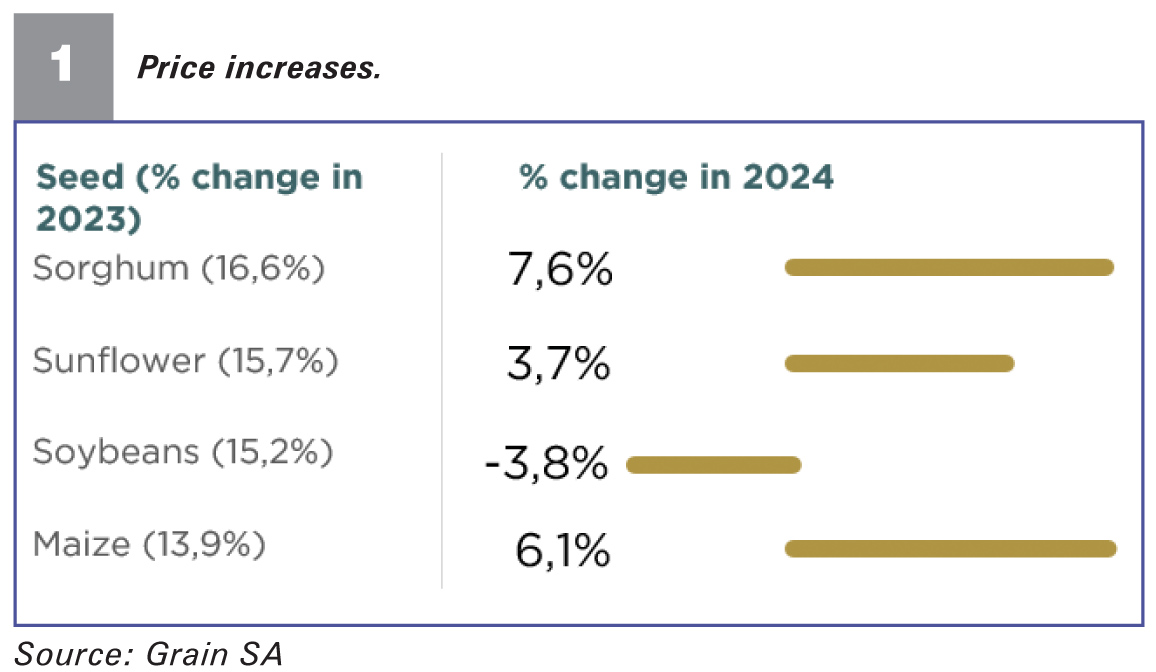August 2024
| JOHAN TEESSEN, AGRICULTURAL ECONOMIST INTERN, GRAIN SA |
 |
Among all the expenses incurred by a farmer, the cost of seeds often goes unnoticed on the production budget. Depending on the plant population, the cost of seeds can range from 10% to 17% of the total input cost and, in certain instances, can even surpass the cost of fuel.
This article delves into the anticipated seed costs for the 2024/2025 season, along with offering some advice on purchasing seeds and seed treatments.
SEED PRICE
During the 2024/2025 production season, combined maize prices surged by an average of 6,1%, leading to an increase that is almost half of the 13,9% rise observed in the 2023/2024 season.
Breaking it down, the average price of white maize escalated by 6,84%, while yellow maize had a 7,45% increase. Additionally, it’s notable that the price of white maize is approximately 0,54% higher than the price of yellow maize.
Sunflower prices experienced a modest 3,7% increase, in stark contrast to the 15,7% surge witnessed in the previous season. Soybeans, on the other hand, encountered an average price decrease of 3,8%, compared to the 15,2% hike recorded last season. Sorghum prices saw a 7,6% increase for the 2024/2025 season, down from the 16,6% increase in the 2023/2024 season.
The information mentioned above can also be seen visually in Figure 1.
In terms of inflation rates, for January 2024, which stood at 5,3%, sunflower prices experienced a rise lower than the inflation rate, while maize prices were 0,8% higher and sorghum prices 2,3% higher.
GUIDELINES WHEN BUYING SEED
Treatment of seeds
Seed companies cannot guarantee the quality of seeds, unless the seed treatment is performed by the seed company itself or by a registered chemical supplier utilising ISO-accredited equipment and processes.
If the treatment is conducted by a chemical supplier, he must ensure that the treatment does not compromise seed germination. Additionally, the chemical used must be registered under Act 36 of 1947 and preferably endorsed by the seed company for the specific cultivar. Treatment of Rhizobium is exempted. Growers are advised to consult with seed companies regarding the most effective
Rhizobium for their cultivars.
It is recommended that growers who opt not to purchase pre-treated seeds and wish to treat them later, collaborate with either the seed company or an ISO-accredited chemical supplier.
CONCLUSION
Seed constitutes not only 10% to 17% of your input costs, varying based on the cultivar and plant population, but also significantly influences the appearance and yield of the crop. Hence, it is imperative to conduct thorough research and seek advice from knowledgeable individuals when selecting and purchasing seeds. This ensures that you choose the optimal cultivar, tailored not only to your specific requirements but also suitable for your farm and environmental conditions.
Publication: August 2024
Section: Pula/Imvula